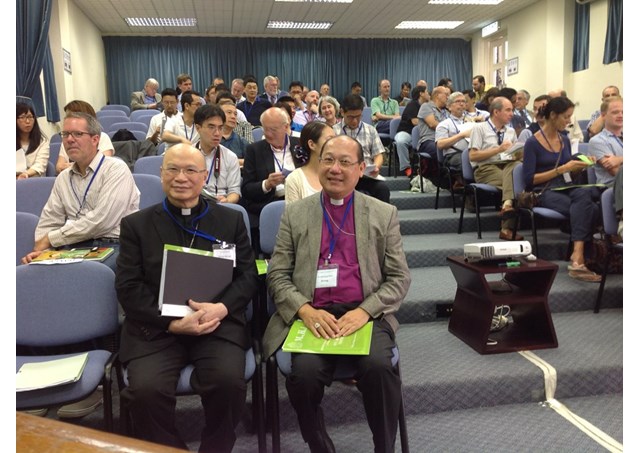
Churches building bridges of dialogue in Hong Kong

(Vatican Radio) The complex world of Christianity in China is the focus of an ecumenical conference that opened in Hong Kong on Wednesday. Organised by the Ecclesiological Investigations International Research Network, the four day meeting brings together theologians and scholars to explore the past, present and future of the Churches in China, as well as in the wider Asian context.
Philippa Hitchen is attending the conference and talked to two of the key speakers at the opening session, Anglican Archbishop Paul Kwong and Bishop Michael Yeung, auxiliary of the Catholic diocese of Hong Kong…
“Dialogue is a must” because “differences cannot be resolved by accusations and insults”. While those words resonate with anyone involved in ecumenical endeavours, they take on a particular resonance when spoken here in Hong Kong, where the Churches struggle to uphold an uneasy yet vital relationship with the Communist Party leadership in mainland China.
I last visited this tiny territory 20 years ago, when it was still under British rule, preparing with some trepidation for the handover to Chinese sovereignty. I heard a lot of fears, back then, about the way democracy could be undermined, despite guarantees enshrined in the ‘ Basic Law’ spelling out the way Hong Kong would maintain its autonomy as a Special Administrative Region of China.
Two decades on, superficially at least, the place looks more vibrant than ever, an international hub of tourism, trade and financial affairs. Yet the Occupy Central protest movement, which hit the headlines in the autumn of 2014, showed the way young people in particular are still unhappy with the way China elects its Chief Executive for Hong Kong. They want greater freedoms and wider participation in the Legislative Council which chooses its leaders and they’re willing to take to the streets again to make their voices heard.
So where do Church leaders stand with regard to these demonstrations and demands for democracy? Anglican Archbishop Paul Kwong told conference participants he’s saddened by the unrest and stresses the importance of developing greater trust between Hong Kong and China. He’s also a member of a Beijing advisory body known as the Chinese People’s Political Consultative Conference, through which, he says, he’s able to make the concerns of Christians better known. The best way to do this, he insists, is in what he terms ‘the Chinese way’, not shouting or mounting campaigns, but quietly, courteously, insisting that freedom of religion must be respected.
Catholic Bishop Michael Yeung has a different approach grounded in more than two decades spent working with Caritas Hong Kong. Without denying the many difficulties the Church faces, he insists on the formation of hearts through education and the importance of Catholic social teaching to serve those most in need. Caritas is currently leading efforts to establish a fully recognised Catholic University in Hong Kong, open to students from the mainland as well.
Despite recent reports of progress in the Holy See’s relations with China, Bishop Yeung say it won’t be easy to overcome key obstacles regarding the appointment of bishops and the recognition of papal authority. But he and the Anglican leader both believe firmly in the ability of dialogue to ease tensions, building trust that can help nudge diplomatic relations forward.
Pope Francis keeps urging us to build bridges of dialogue, Bishop Yeung says, and that’s exactly what we must keep doing here too.
| All the contents on this site are copyrighted ©. |


